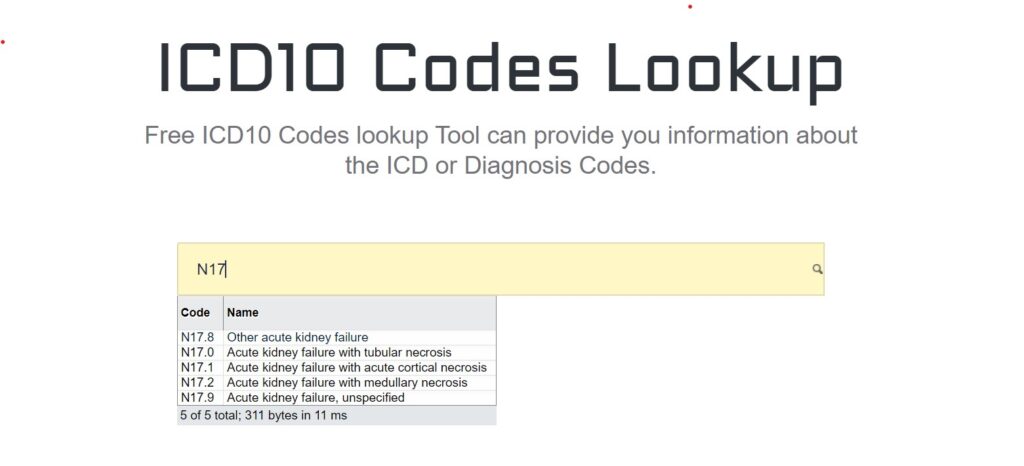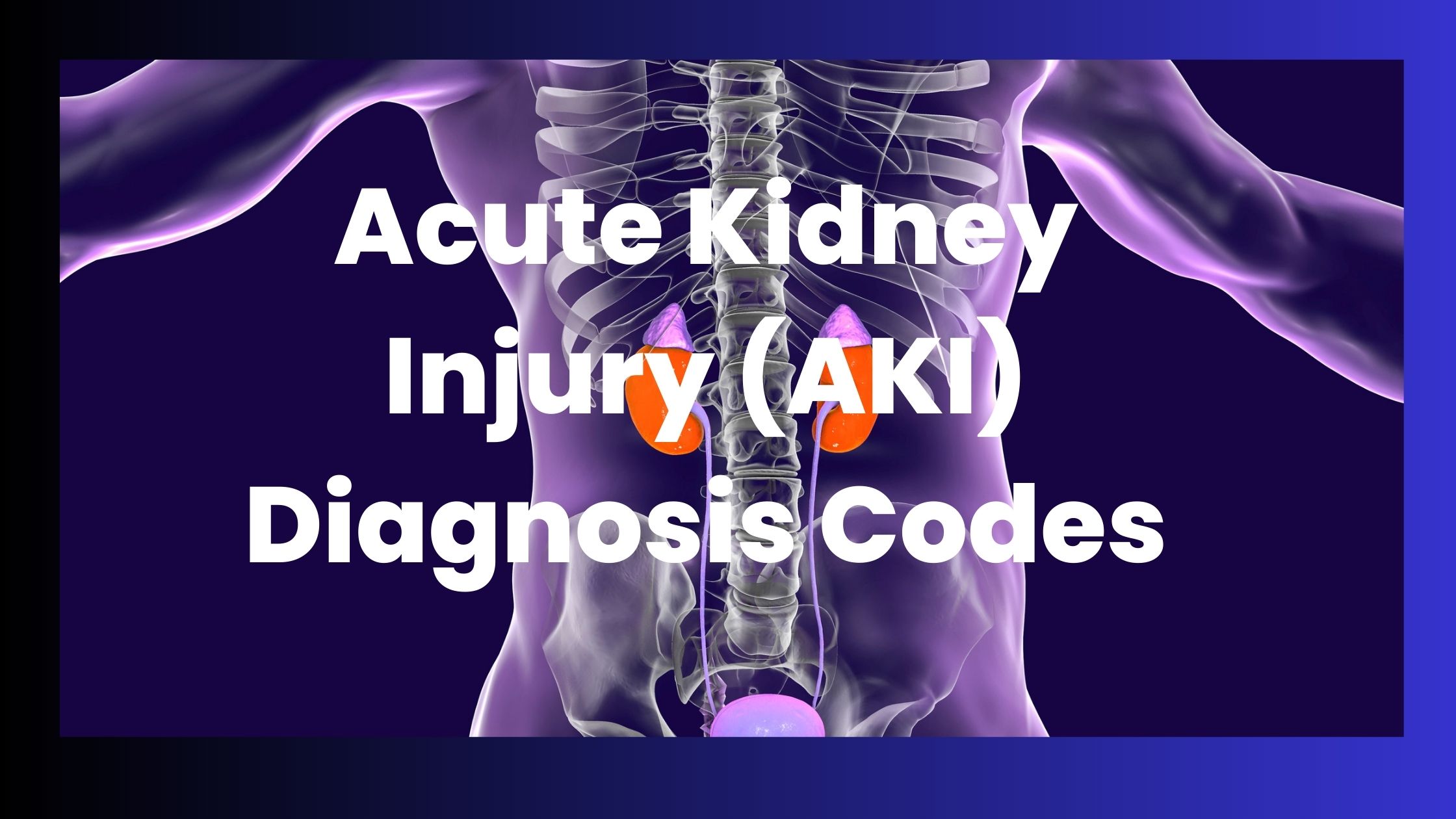Welcome to this comprehensive guide on the Aki ICD-10 code. In this article, we will discuss the diagnosis of acute kidney injury (AKI) and delve into the importance of the ICD-10 code in accurately documenting and classifying this condition.
AKI (Acute Kidney injury) is a critical medical condition that requires prompt recognition and appropriate management to ensure the best possible patient outcomes. By understanding the Aki ICD-10 code and its significance, healthcare providers can effectively communicate and track cases of AKI, aiding in research, treatment, and healthcare planning.
AKI ICD-10-CM Code
AKI ICD 10 Code is N17.9 for unspecified and other related to acute kidney injury codes as mentioned below,

| ICD Codes | Description |
| N15.0 | Balkan nephropathy |
| N15.1 | Renal and perinephric abscess |
| N15.8 | Other specified renal tubulo-interstitial diseases |
| N15.9 | Renal tubulo-interstitial disease, unspecified |
| N16 | Renal tubulo-interstitial disorders in diseases classified elsewhere |
| N17 | Acute kidney failure |
| N17.0 | Acute kidney failure with tubular necrosis |
| N17.1 | Acute kidney failure with acute cortical necrosis |
| N17.2 | Acute kidney failure with medullary necrosis |
| N17.8 | Other acute kidney failure |
| N17.9 | Acute kidney failure, unspecified |
| N18 | Chronic Kidney Disease |
| N18.1 | Chronic kidney disease, Stage 1 |
| N18.2 | Chronic kidney disease, Stage 2 |
| N18.3 | Chronic kidney disease, Stage 3 (moderate) |
| N18.30 | Chronic kidney disease, Stage 3 unspecified |
| N18.31 | Chronic kidney disease, Stage 3a |
| N18.32 | Chronic kidney disease, Stage 3b |
| N18.4 | Chronic kidney disease, Stage 4 (Severe) |
| N18.5 | Chronic kidney disease, Stage 5 |
| N18.6 | End Stage Renal Disease (ESRD) |
Aki ICD-10 Code: A Key Diagnostic Tool
What is the Aki ICD-10 code?
The aki ICD-10 code refers to the specific (ICD-10) is N17.9 , to identify and classify cases of acute kidney injury. ICD-10 is a globally recognized system for classifying and documenting various medical conditions and is widely used by healthcare providers, researchers, and insurers for accurate record-keeping and data analysis.
Importance of the AKI ICD-10 code
The Aki ICD-10 code plays a crucial role in healthcare documentation and coding. It provides a standardized way to identify, classify, and track cases of AKI across different healthcare settings and regions. This uniformity enables effective communication between healthcare professionals, facilitates research on AKI, and ensures accurate billing and reimbursement processes. Furthermore, the Aki ICD-10 code helps monitor the incidence and prevalence of AKI, allowing healthcare planners to allocate appropriate resources for prevention, treatment, and long-term care.
Understanding Acute Kidney Injury (AKI)
What is acute kidney injury?
Acute kidney injury is also known in medical terms as acute renal failure. It is a sudden and often reversible loss of kidney function. It is characterized by a rapid decline in the kidneys’ power to filter waste products and maintain electrolyte and fluid balance in body. AKI can occur due to various factors, including dehydration, infections, medication toxicity, kidney obstruction, or reduced blood flow to the kidneys. For healthy kidney can take some good ingredients of supplements as well
Signs and symptoms of AKI
The signs and symptoms of AKI can vary depending on the severity of the condition. Common manifestations of AKI include:
- Decreased urine output or no urine production
- Fluid retention and swelling (oedema)
- Fatigue and weakness
- Shortness of breath
- Confusion and decreased mental sharpness
- Nausea and vomiting
- Chest pain or pressure
- High blood pressure
Recognizing these symptoms promptly and seeking medical attention to prevent further complications is essential.
Frequently Asked Questions (FAQs)
Ans. AKI can result from various causes, including:
Dehydration
* Severe infections (such as sepsis)
* Medications toxic to the kidneys (e.g., certain antibiotics or non-steroidal anti- inflammatory drugs)
* Kidney obstruction (e.g., kidney stones)
* Reduced blood flow to the kidneys (e.g., due to low blood pressure or heart failure)
Ans. In many cases, AKI is reversible with appropriate and timely management. Identifying and treating the underlying cause, maintaining fluid and electrolyte balance, and supporting kidney function can help recover renal function.
Ans. The treatment of AKI depends on the the severity of the condition, and the patient’s health. It may involve:
* Addressing the underlying cause (e.g., managing infections or stopping nephrotoxic medications)
* Fluid and electrolyte management
* Medications to support kidney function
* Dialysis or other renal replacement therapies in severe cases
Ans. Yes, severe or recurrent type of AKI can increase the chance of chronic kidney disease. Regular follow-up with a healthcare provider is crucial to monitor kidney function and identify early signs of CKD.
Ans. Preventing AKI involves managing risk factors and taking appropriate precautions, such as:
* Staying hydrated
* Using medications as prescribed and avoiding nephrotoxic drugs
* Seeking prompt medical attention for infections or other conditions that can affect kidney function
* Monitoring kidney function in high-risk individuals, such as those with diabetes or hypertension
Ans. Severe cases of AKI can be life-threatening, particularly if left untreated or if the underlying cause is not addressed promptly. Timely diagnosis and appropriate management are crucial to prevent complications and improve patient outcomes.
Conclusion
In conclusion, understanding the Aki ICD-10 code is essential for accurate documentation and classification of acute kidney injury. The Aki ICD-10 code is a standardized tool that enables effective communication, research, and resource allocation for AKI. This code allows healthcare providers to better diagnose, treat, and prevent AKI, ultimately improving patient care and outcomes.
Related Articles:
ICD-10-CM Dx Code N19 | ICD 10 codes Renal Failure

